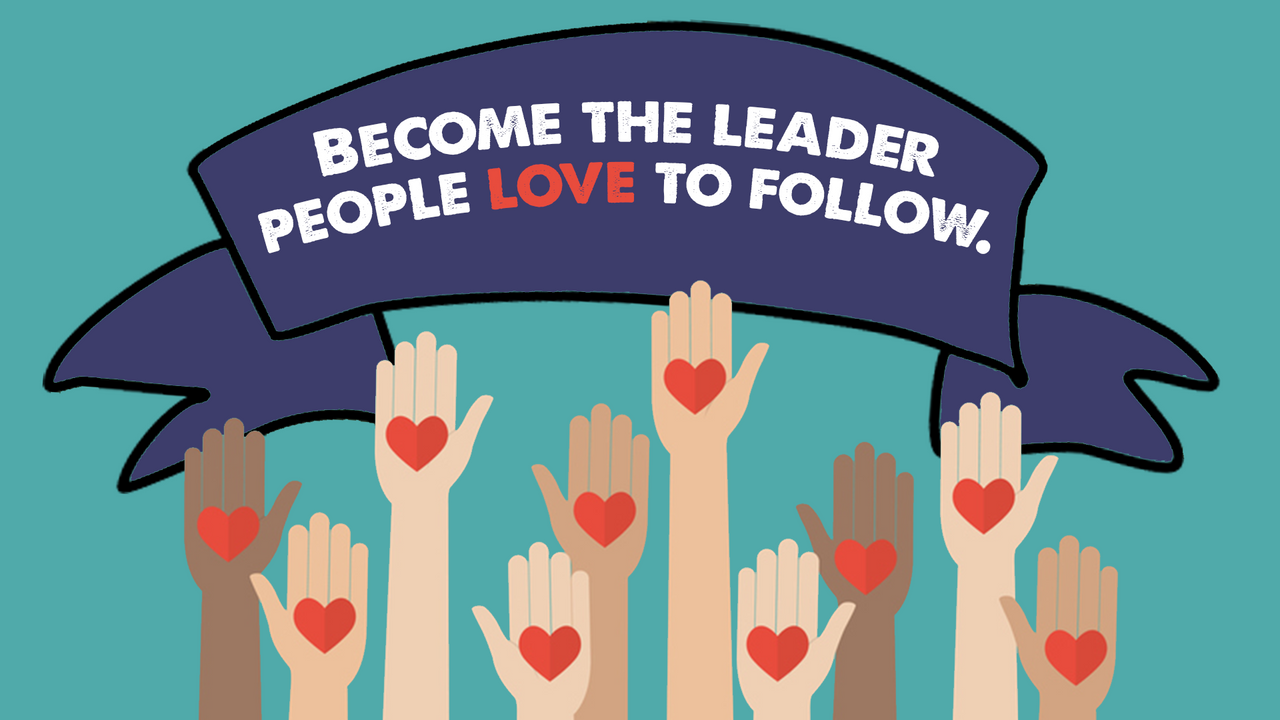Become the leader people love to follow.
Jul 13, 2022
The secret to being a good leader is having a high EQ.
Great leaders inspire us to reach our potential and realize the vision or goals at hand. They do it by fostering cultures where feelings associated with safety, wellness, hope and performance are present and minimizing situations that bring feelings of hopelessness and overwhelm.
None of this happens by accident.
The best leaders have a high EQ (also known as Emotional Quotient, or emotional intelligence). They are aware of their feelings and how their reactions to their own feelings may impact others. They're also tuned into the emotions and reactions of the people around them, and adjust their own behavior in order to address the concerns of others. Some of the twenty-first century's most influential leaders—Tim Cook, Barack Obama, and Jacinda Ardern to name a few—have spoken about the importance of empathy in times of crisis. But it's not just about putting out fires... high EQ is also about inspiring others and bringing out the best in them.
Here are four examples of how a high EQ can impact leadership in a positive way.
 We don't often think about leaders of countries in an emotional way, but that's exactly the type of leadership that can get impactful results, if it's used correctly. During the COVID-19 pandemic, New Zealand's prime minister Jacinda Ardern communicated frequently and transparently with her fellow citizens, enacting swift and strict measures to limit the spread. In an era of rampant disinformation and widespread government mistrust, her live-streamed conversations with regular citizens on social media helped to quell concerns and solidify buy-in on her emergency measures.[1] Because of her high EQ, Ardern was able to sense the fear that people were feeling, and work to address it in a meaningful and immediate way through the rapid communication of facts delivered with heart. She even gave herself a 20% wage cut in solidarity with those who lost jobs or had to take a reduced salary due to the pandemic. During a press conference after New Zealand had emerged from the pandemic, Ardern thanked her fellow citizens for their cooperation and referred to them as her “team of five million.” Empathetic gestures like these have earned her a popularity rating not seen in the country in at least a century.[2]
We don't often think about leaders of countries in an emotional way, but that's exactly the type of leadership that can get impactful results, if it's used correctly. During the COVID-19 pandemic, New Zealand's prime minister Jacinda Ardern communicated frequently and transparently with her fellow citizens, enacting swift and strict measures to limit the spread. In an era of rampant disinformation and widespread government mistrust, her live-streamed conversations with regular citizens on social media helped to quell concerns and solidify buy-in on her emergency measures.[1] Because of her high EQ, Ardern was able to sense the fear that people were feeling, and work to address it in a meaningful and immediate way through the rapid communication of facts delivered with heart. She even gave herself a 20% wage cut in solidarity with those who lost jobs or had to take a reduced salary due to the pandemic. During a press conference after New Zealand had emerged from the pandemic, Ardern thanked her fellow citizens for their cooperation and referred to them as her “team of five million.” Empathetic gestures like these have earned her a popularity rating not seen in the country in at least a century.[2]
 You may have heard of the power of a hand-written thank you note. The former CEO of PepsiCo Indra Nooyi took it a step further, writing a letter to the parents of each member on her executive team. In her letters, she explained the unique value and contributions of each employee and said, “Thank you for the gift of your child to our company.” The response was overwhelmingly positive, with some executives saying that it was the best thing that had happened to their parents. Nooyi's strategy to inspire employees by “hooking them emotionally to the job" seems to have paid off. During her time at PepsiCo, she achieved a 75% in-house approval rating.[3]
You may have heard of the power of a hand-written thank you note. The former CEO of PepsiCo Indra Nooyi took it a step further, writing a letter to the parents of each member on her executive team. In her letters, she explained the unique value and contributions of each employee and said, “Thank you for the gift of your child to our company.” The response was overwhelmingly positive, with some executives saying that it was the best thing that had happened to their parents. Nooyi's strategy to inspire employees by “hooking them emotionally to the job" seems to have paid off. During her time at PepsiCo, she achieved a 75% in-house approval rating.[3]
 As the first black woman to serve as CEO of a major corporation, Ursula Burns is no stranger to transformation. Going from a childhood in a low-income housing project to the head of Xerox corporation took both hard work and courage. She used her experience to help boost employee strength and morale while transitioning the business from its core offering of photocopying into a more relevant position in the tech world. Of her leadership style, she recounts, "One of my predecessors always said, 'You should never let the people see you sweat,' and I have exactly the opposite approach. We have to know each other. We as a team make up the whole. Me, alone, would leave a ton of blind spots."[4] This kind of humility and honesty served her well; it empowered everyone on her team to take responsibility for the success of the transition. While the company has since been plagued by a series of challenges, including pressure from an activist shareholder, her leadership set the stage for a number of transformative changes and acquisitions that have helped the company maintain its relevance in a rapidly changing industry.
As the first black woman to serve as CEO of a major corporation, Ursula Burns is no stranger to transformation. Going from a childhood in a low-income housing project to the head of Xerox corporation took both hard work and courage. She used her experience to help boost employee strength and morale while transitioning the business from its core offering of photocopying into a more relevant position in the tech world. Of her leadership style, she recounts, "One of my predecessors always said, 'You should never let the people see you sweat,' and I have exactly the opposite approach. We have to know each other. We as a team make up the whole. Me, alone, would leave a ton of blind spots."[4] This kind of humility and honesty served her well; it empowered everyone on her team to take responsibility for the success of the transition. While the company has since been plagued by a series of challenges, including pressure from an activist shareholder, her leadership set the stage for a number of transformative changes and acquisitions that have helped the company maintain its relevance in a rapidly changing industry.
 As the former CEO of Starbucks, Howard Schultz used an emotionally intelligent model to grow the company from just 17 stores in the US and Canada to over 32,660 stores across the globe.[5] He was inspired by a trip to Italy where he observed that coffee houses functioned as a "third place"—somewhere people could gather outside of work and home. After that trip, he set out to transform the company's stores to places where people could linger, sit and read the paper, chat with friends, or just watch the world go by around them. However, his EQ didn't just impact the Starbucks product offering. Remembering the devastating effect of his father's health insurance revocation after being injured on the job (and subsequently fired), Schultz set out to ensure that his employees (Starbucks refers to them as "partners") would never have the same difficulties.
As the former CEO of Starbucks, Howard Schultz used an emotionally intelligent model to grow the company from just 17 stores in the US and Canada to over 32,660 stores across the globe.[5] He was inspired by a trip to Italy where he observed that coffee houses functioned as a "third place"—somewhere people could gather outside of work and home. After that trip, he set out to transform the company's stores to places where people could linger, sit and read the paper, chat with friends, or just watch the world go by around them. However, his EQ didn't just impact the Starbucks product offering. Remembering the devastating effect of his father's health insurance revocation after being injured on the job (and subsequently fired), Schultz set out to ensure that his employees (Starbucks refers to them as "partners") would never have the same difficulties.
Even amidst pressure from investors, Schultz held strong to his position that all employees, including part timers, would have access to health insurance.[6] In addition to health insurance, Starbucks currently offers stock options, paid time off, paid parental leave, and 100% tuition coverage for Arizona State University's online degree program to its employees.[7]
Schultz's culture of caring at Starbucks has led the company to achieve high marks for employee loyalty. In fact, its employee turnover rate in 2014 was two to six times lower than the rest of the quick service industry[8] and in 2020, it won awards for Best Company for Women, Best Company Work-Life Balance, Best Company Perks & Benefits, and Best Company Happiness.[9]
If you want to be more like these inspirational leaders, all it takes is a little practice. Here are five things you can start working on now to increase your EQ:
- When faced with challenges, try to be proactive rather than reactive
- Find healthier ways of dealing with negative emotions, such as reframing, deep breathing, exercise, or taking a 5-minute pause before reacting
- Be aware of your mood and how it may impact others
- Listen to the meaning behind words and try to empathize with how others may be feeling
- Be more honest with yourself about your emotions rather than suppressing them
No leader is perfect, but with careful attention to building emotional awareness and responsiveness, every leader has the power to inspire and motivate their team.
About the Author
Sandra McDowell, MA, PCC, CPHR, SHRM-SCP
As the founder and voice behind eLeadership Academy™, Sandra McDowell helps leaders and organizations increase performance and well-being by leveraging insights from cognitive science to harness the untapped power of the brain.
Sources:
[1] https://www.tandfonline.com/doi/full/10.1080/13678868.2020.1779543
[2] https://www.reuters.com/article/us-newzealand-politics-poll/ardern-becomes-new-zealands-most-popular-pm-in-a-century-poll-idUSKBN22U0PI
[3] https://pagely.com/blog/emotionally-intelligent-ceos/
[4] https://www.cmu.edu/tepper/news/stories/2015/november/2015-11-3-ursula-burns-presentation-wl-mellon.html
[5] https://financesonline.com/number-of-starbucks-worldwide/
[6] https://money.cnn.com/2010/06/07/news/companies/starbucks_schultz_healthcare.fortune/index.htm
[7] https://www.starbucks.com/careers/working-at-starbucks/benefits-and-perks
[8] https://www.restaurantdive.com/news/all-us-starbucks-employees-to-make-at-least-15-an-hour-in-3-years/591968/
[9] https://www.comparably.com/companies/starbucks/awards/2020


